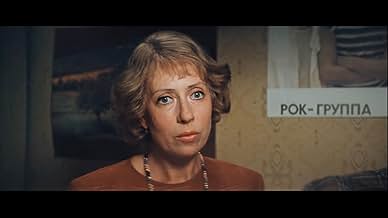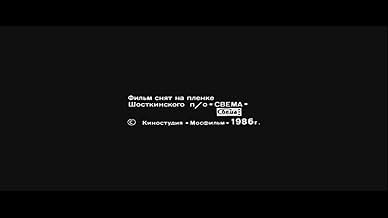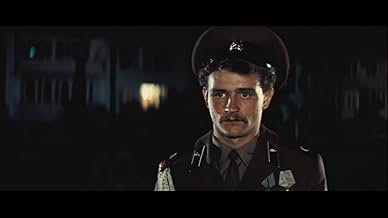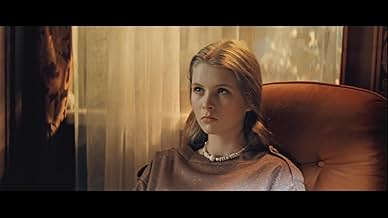AVALIAÇÃO DA IMDb
7,7/10
6,3 mil
SUA AVALIAÇÃO
A história de um adolescente em tempos da queda do comunismo na União Soviética.A história de um adolescente em tempos da queda do comunismo na União Soviética.A história de um adolescente em tempos da queda do comunismo na União Soviética.
- Direção
- Roteiristas
- Artistas
- Prêmios
- 1 vitória e 2 indicações no total
Aleftina Evdokimova
- Mariya Viktorovna Kuznetsova
- (as Alevtina Yevdokimova)
Andrei Vertogradov
- Fyodor Ivanovich Miroshnikov
- (as A. Vertogradov)
Eleonora Zubkova
- Birthday Guest
- (as E. Zubkova)
Nikolay Kornoukhov
- Sotrudnik otdela kadrov
- (as N. Kornaukhov)
Larisa Kurdyumova
- Birthday Guest
- (as L. Kurdyumova)
Olimpiada Kalmykova
- Birthday Guest
- (as O. Kalmykova)
Vera Sotnikova
- Natasha
- (as V. Sotnikova)
Alika Smekhova
- Nina
- (as A. Smekhova)
- Direção
- Roteiristas
- Elenco e equipe completos
- Produção, bilheteria e muito mais no IMDbPro
Avaliações em destaque
I looked at the well-known painting "Courier"quite differently. At the time of my "mid-teens", this film did not exactly not touch me, it was boring and even disgusted. I dare say, 10 years ago, I was already annoyed by one image of Ivan...
Today I saw a lot of new things, I got into the fate of the heroes. I just watched a movie that I should have SEEN a long time ago. It happens. Amazing feeling. And even Ivan appeared to me in a completely different person. I laughed a lot from the heart and also thought a lot about the eternal questions of our common life...
I recommend this film for viewing, especially to new generations, for whom many of the messages of this picture could become a successful bulwark in the arrangement of life priorities, which I personally, alas, could not cope with on my own at the time.
Today I saw a lot of new things, I got into the fate of the heroes. I just watched a movie that I should have SEEN a long time ago. It happens. Amazing feeling. And even Ivan appeared to me in a completely different person. I laughed a lot from the heart and also thought a lot about the eternal questions of our common life...
I recommend this film for viewing, especially to new generations, for whom many of the messages of this picture could become a successful bulwark in the arrangement of life priorities, which I personally, alas, could not cope with on my own at the time.
I imagine that Courier holds a similar place in Russian youth culture to the role John Hughes' movies hold in American culture; at the very least, I hope it does. Shakhnazarov's film is recognizably set in the 1980's, but it also seems to be timeless (besides the idiosyncratically 80's music), and this is perhaps due to the selective portrayal of Moscow. The majority of cinematic depictions of the city, where famous locations are shown at a remarkable landmark to frame ratio, make the city so prominent that it's hard to differentiate it from human characters. In Courier, however, the uniformity of Soviet dwellings and buildings make the city anonymous; the only obvious references to it are in name only. This adds to the universality of the film and Ivan's experiences. While Ivan frustrates with his nonchalance and frequent lying, the poetic scenes that Shakhnazarov fits in the corners belie the heart of the film, as well as the inner workings of Ivan's mind. Stereotypically "African" warriors haunt his dreams; he converses with a bust of his very-much-alive father in a mausoleum. At the end of the day, Ivan comes off as scared and confused at the aftermath of his parents' divorce that overshadows his mother's and his own life. The film vacillates between a gritty, saturated daily life and a surreal subconscious effortlessly. By the end, the viewer finds themselves sympathizing with Ivan. It is an accessible film for all ages in any era, although unfortunately my own life doesn't include break dancing to heavy synthesizers as the sun sets.
The Messenger Boy brought the "gritty reality" of the time approaching the end of the Soviet Union to the screen in a much more enjoyable way than other Chernukhas like Little Vera. Although the main character Ivan represents the rebellion and insolence that was associated with the young generation of the time without any restraint, there was an underlying positive quality, almost a purity, in him that singled him out as an authentic, "good" person of the time.
A great way to describe this masked purity would be to compare Ivan with Holden Caulfield, the protagonist of J.D. Salinger's The Catcher in the Rye. Both characters share a certain "unlikeability" among their elders and the older generation of the society of which they are part, but their frankness is seen as a positive directional icon to their own generation. Each dropped out of school and flops around society with either a poor job or none at all, but is nevertheless seen as a lost child in a dirty world, and hence pitied for their genuineness. Katia enjoyed Ivan's tactless mannerisms much like Holden's friends (however few) enjoyed his general apathy--they felt a bond with each representation of the "lost generation."
The movie truly made one feel for Ivan's plight--it's not that he did not care, it is simply that the society of which he was part was falling apart, so their expectations on his behavior did not do much. It is precisely this truth, this authenticity, that made Ivan, and the entire movie, so enjoyable to watch. Finally, props to Oleg Basilashvili, the actor who played Katia's father, to be able to switch roles so effectively from The Autumn Marathon as Bouzikin to The Messenger Boy-- it almost seemed like nothing had changed, it is just that time has passed between the two, which further adds to the truth value of this particular film.
A great way to describe this masked purity would be to compare Ivan with Holden Caulfield, the protagonist of J.D. Salinger's The Catcher in the Rye. Both characters share a certain "unlikeability" among their elders and the older generation of the society of which they are part, but their frankness is seen as a positive directional icon to their own generation. Each dropped out of school and flops around society with either a poor job or none at all, but is nevertheless seen as a lost child in a dirty world, and hence pitied for their genuineness. Katia enjoyed Ivan's tactless mannerisms much like Holden's friends (however few) enjoyed his general apathy--they felt a bond with each representation of the "lost generation."
The movie truly made one feel for Ivan's plight--it's not that he did not care, it is simply that the society of which he was part was falling apart, so their expectations on his behavior did not do much. It is precisely this truth, this authenticity, that made Ivan, and the entire movie, so enjoyable to watch. Finally, props to Oleg Basilashvili, the actor who played Katia's father, to be able to switch roles so effectively from The Autumn Marathon as Bouzikin to The Messenger Boy-- it almost seemed like nothing had changed, it is just that time has passed between the two, which further adds to the truth value of this particular film.
The symbolism of the degeneration of the Soviet project is revealed in perhaps the film's most bizarre scene: Ivan speaks to a bust of his father in what looks like an abandoned mausoleum. And if the father-conqueror-of-spaces becomes a bust of the Secretary General, a mummy...
Early Perestroika years in Moscow. The Communist regime has brought about relative wealth and comfort, but also growing differences between the haves and the have nots. Belonging to the middle-upper class means working hard and conforming. Ivan Miroshnik is a teenager pampered by his mum who has just divorced. He plans neither to work hard nor to conform. After uncaringly failing his university entrance exams, he does not know what to do with himself, but mum finds him a job as a messenger boy in a small editing house. On his first day at work Ivan is sent to take a parcel to professor Kuznetsov, who belongs to the successful upper class. On arrival, he meets Katya, the professor's daughter, and quickly and effectively sets out to charm her with his cheek and impudence. Katya has led a protected life and quickly takes to Ivan's "originality", while Ivan goes with the flow. As to professor Kuznetsov, he decides that Ivan is just a supplied, rude and nihilist young man.
Ivan and Katya meet, alone or with their usual group of friends, and class differences soon become painfully obvious. Ivan's constant dubious practical jokes, probably the only means he has to try and please, start to lead to very unpleasant situations.
This film is about the wavering of youth, sexual attraction among people with different backgrounds, about clashes between generations, the end of the Soviet Union and the rejection of its values by younger people. Very interesting and honest analysis of Katya's psyche, achieved with just a few brush strokes.
This film got several prizes when it was released, and has aged well, since it contains sufficient reflections on universal issues (clothes and hairstyles aside, perhaps). Good musical score by E. Artemev.
Ivan and Katya meet, alone or with their usual group of friends, and class differences soon become painfully obvious. Ivan's constant dubious practical jokes, probably the only means he has to try and please, start to lead to very unpleasant situations.
This film is about the wavering of youth, sexual attraction among people with different backgrounds, about clashes between generations, the end of the Soviet Union and the rejection of its values by younger people. Very interesting and honest analysis of Katya's psyche, achieved with just a few brush strokes.
This film got several prizes when it was released, and has aged well, since it contains sufficient reflections on universal issues (clothes and hairstyles aside, perhaps). Good musical score by E. Artemev.
Você sabia?
- CuriosidadesSeeing from advance screenings that the film was appealing largely to teenage audiences, the original June release date was postponed since in the USSR at that time young people tended to engage in outdoor activities or leave town for travel during the summer.
- ConexõesFeatures Combate Mortal (1975)
- Trilhas sonorasTrava u doma
Music by Vladimir Migulya
Lyrics by Anatoliy Poperechnyy
Performed by Fyodor Dunayevsky and Inna Churikova
Principais escolhas
Faça login para avaliar e ver a lista de recomendações personalizadas
- How long is Courier?Fornecido pela Alexa
Detalhes
- Data de lançamento
- País de origem
- Central de atendimento oficial
- Idioma
- Também conhecido como
- Courier
- Empresa de produção
- Consulte mais créditos da empresa na IMDbPro
Bilheteria
- Faturamento bruto mundial
- US$ 20.192
Contribua para esta página
Sugerir uma alteração ou adicionar conteúdo ausente

Principal brecha
By what name was O Mensageiro (1986) officially released in India in English?
Responda































